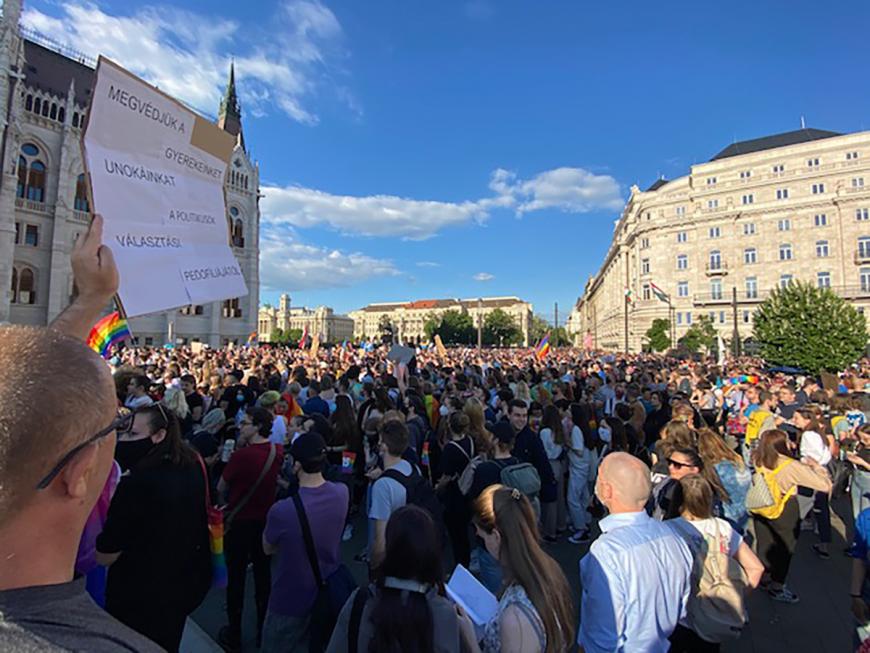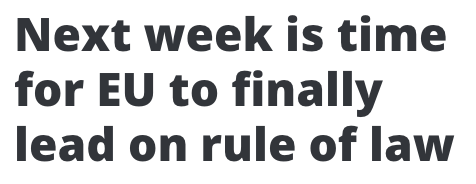
Is the EU finally going to get serious next week about the long-running assaults on human rights and democracy in Hungary & Poland? 

EU members meeting in the General Affairs Council session on 22 June will discuss the situations in Poland & Hungary under Article 7, the EU treaty mechanism to hold accountable governments whose actions threaten the bloc’s rule of law, human rights and democratic principles.
The EU must put Hungary & Poland on notice that there is no place for attacks on the rule of law in the EU & step up scrutiny of their rights-abusiving policies, say:
@amnesty;
@hrw;
@ICJ_org;
@fidh_en;
@osfEUpolicy;
@RSF_en.
New joint statement: hrw.org/news/2021/06/1…
@amnesty;
@hrw;
@ICJ_org;
@fidh_en;
@osfEUpolicy;
@RSF_en.
New joint statement: hrw.org/news/2021/06/1…

It is absolutely tragic that leaders from the EU & its member states have let Hungary & Poland deteriorate like this.
The EU used to be a bloc of exclusively democratic states.
Now, no longer.
The EU has become a hybrid of democratic & anti-democratic countries.
The EU used to be a bloc of exclusively democratic states.
Now, no longer.
The EU has become a hybrid of democratic & anti-democratic countries.
For too long, @vonderleyen's @EU_Commission has offered few signs of prioritising the fight for the rule of law, doing nothing to revive scrutiny under Article 7, the EU treaty mechanism to deal with states putting EU's democratic ideals at risk.
Tuesday's European Council meeting will now be the first time the EU has looked at Article 7 since September 2018 on Poland and since December 2019 on Hungary.
True, the commission has continued to use legal infringements against member states in breach of the rule of law – but often too late and too slowly, and it failed to react quickly when states ignored key EU Court rulings.
The Commission's new rule-of-law report includes detailed analysis for each member state but doesn't lead to any consequence for states failing to meet their obligations.
The flawed deal between the EU heads of states and von der Leyen's Commission on rule-of-law conditionality for EU funding watered down the provisions and delayed their introduction, leading frustrated European Parliamentarians to take the commission to court to speed things up.
Feeling the heat, the Commission seems to have finally taken a grudging step this week, according to this report from @richbravoBXL & @nchrysoloras yesterday:
bloomberg.com/news/articles/…
bloomberg.com/news/articles/…

But while Brussels has dithered, the situations in both Hungary & Poland have continued to worsen...
In Poland, judges face unfair disciplinary proceedings - that's serious interference with their independence.
The government transformed the Constitutional Tribunal into a court at its service and used it to bypass parliament.
The government transformed the Constitutional Tribunal into a court at its service and used it to bypass parliament.
Poland's government has used this co-opted tribunal to discontinue the ombudsman's mandate and to virtually ban access to legal abortion, putting the lives and dignity of millions of women at risk.
In Hungary, the government used the Covid-19 pandemic as a pretext to increase executive powers.
More independent media were dismantled or taken off the airwaves.
More independent media were dismantled or taken off the airwaves.
Hungary's govt has yet fully to repeal a law targeting access to foreign funding for civil society groups over a year after the EU Court of Justice ruled it violated EU law, while a controversial 2018 law criminalising groups giving assistance to asylum seekers remains in place.
In both Hungary & Poland, #LGBTI people have become ruling-party targets for harassment, smear campaigns & restrictive laws.
Dehumanising language against this vulnerable minority comes from top officials, including the Polish president.
Dehumanising language against this vulnerable minority comes from top officials, including the Polish president.
https://twitter.com/astroehlein/status/1271851473077514242
A new law in Hungary bans discussions on sexual orientation & gender identity, offensively and dangerously equating it with paedophilia.
The ruling party is desperate to spread hate to try to boost its support & divert attention from its corruption.
hrw.org/news/2021/06/1…
The ruling party is desperate to spread hate to try to boost its support & divert attention from its corruption.
hrw.org/news/2021/06/1…

As authoritarian ruling parties in Hungary & Poland have moved quickly to expand their power, the EU & other member states have responded glacially - when they respond at all.
Now, with next week's European Council meeting on Hungary & Poland, that has to change.
Now, with next week's European Council meeting on Hungary & Poland, that has to change.
The Council meeting next week has to be something different, something new.
It has to mark the start of the EU actively and intensively fighting to get its democratic soul back.
It has to mark the start of the EU actively and intensively fighting to get its democratic soul back.
Thankfully, some EU member states seem to get it...
https://twitter.com/eublogo/status/1405761760229957638
EU ministers next week should commit to regularly scrutinise the situations and hold both governments to account, and urgently move toward adopting rule-of-law recommendations and voting to determine that there is a "clear risk of serious breach" of EU values in both countries.
The European Commission should also help by using its authority to trigger legal infringements that are faster and more strategic to ensure that the EU court can block the rule-of-law breakdown in EU states.
In addition, the Commission should urgently boost its support for Article 7 by, for example, updating & expanding its own December 2017 opinion that triggered proceedings on Poland, and join the September 2018 action of the European Parliament on Hungary.
No more foot-dragging.
No more foot-dragging.
EU member states and the EU Commission still have to prove they are ready to stand up for the rights of every citizen in the EU.
"Prove" means actions, not just high-minded words.
They will be judged by what they do, not by what they say.
"Prove" means actions, not just high-minded words.
They will be judged by what they do, not by what they say.
Poland's ruling party followed Hungary's in its step-by-step dismantling of democracy.
There are other Orbán wannabes in other EU member states itching to do the same.
If EU leaders do not now start clawing back what's been lost, authoritarianism will only spread in the EU.
There are other Orbán wannabes in other EU member states itching to do the same.
If EU leaders do not now start clawing back what's been lost, authoritarianism will only spread in the EU.
The 22 June hearings on Poland & Hungary are critical. As @philippe_dam puts it in @EUobs today:
"This should not be just another Council meeting…
…it should be the beginning of a long & concentrated effort for a true democratic recovery."
euobserver.com/opinion/152161
"This should not be just another Council meeting…
…it should be the beginning of a long & concentrated effort for a true democratic recovery."
euobserver.com/opinion/152161

We need to see EU leaders take a decisive step down the path that leads to the EU being a club of exclusively democratic states again, rather than the democratic/authoritarian hybrid it's been allowed to become.
• • •
Missing some Tweet in this thread? You can try to
force a refresh






